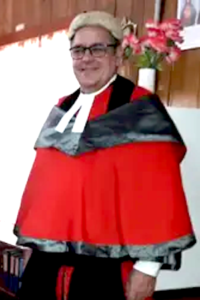A former president of Kiribati warns the crisis involving the island nation’s government and the courts has left the country with a “dysfunctional judiciary” and put a question mark over its democratic system.
The Kiribati government suspended its chief justice in July and last Thursday immigration and police detained and attempted to deport High Court Judge David Lambourne.
They were unsuccessful after the country’s highest court ordered the Australian-born judge to be released.
The Court of Appeal stopped the government from deporting Lambourne pending a further hearing expected to be held this week, escalating further acrimony between the executive and judicial arms of the state.
Anote Tong, who was president of Kiribati from 2003 to 2016, says the issue of Judge Lambourne has clear “political connotations” because he is married to the leader of the opposition.
But, he said, the actions of President Taneti Maamau’s government bordered on contempt of court.
“The deportation order by the president [Maamau] is really in direct contravention to the decision by the court. So, whether the government is now in contempt of court is the question that really needs to be addressed,” Tong told RNZ Pacific.
“To be in direct conflict with the decision of the court here, I think we know what that means.”
‘Abiding by the laws of Kiribati’
In a statement, the government maintained that Judge Lambourne had breached his visa conditions and national laws and raised concern “by the overreach of the Court of Appeal” to issue an injunction to prevent his deportation.

The government said it “abides by the laws and the Constitution of Kiribati … to protect the interest of the people of Kiribati”.
It blamed “neocolonial forces” for “weaponising the laws enacted to protect” the i-Kiribati people “to pursue their own interest and suppress the will of the people”.
But Tong said the separation of powers is a fundamental principle of a democratic society.
“We have a constitution. We have the laws in place, and we have a court. The question is: are we adhering to these legal provisions?,” he asked.
“It looks like the government is crossing that boundary and delving into the purview of the judiciary.”
Tong said the problem between the government and Judge Lambourne began after the 2020 elections when his wife, Tessie Lambourne, was elected as leader of the opposition.
“There is no question about it,” he said, adding it did not “give an excuse for the government to ignore a court decision”.
He said until Kiribati amended its laws and constitution “to recognise that the separation of powers is fundamental to its democratic system of government, everything else that has been done will become illegal”.
International condemnation
The Commonwealth Magistrates’ and Judges’ Association (CMJA), the Commonwealth Legal Education Association (CLEA), and the Commonwealth Lawyers Association (CLA) have all raised concerns and said they were “alarmed” at the situation.
The associations have urged the Kiribati authorities to respect the rule of law and comply with orders of the courts.
“The associations are alarmed that the tribunals set up to investigate alleged misbehaviour by Judge David Lambourne and the Chief Justice William Hastings have yet to report on any findings,” they said via a joint statement.
“The associations are further alarmed that there has been an attempt to deport Judge Lambourne without due process being followed and he has subsequently now been arbitrarily detained by the authorities in Kiribati.”
CMJA, CLEA and CLA are urging the Commonwealth Ministerial Action Group (CMAG) to consider the actions of the Kiribati government as a matter of urgency.
This article is republished under a community partnership agreement with RNZ.
Article by AsiaPacificReport.nz






